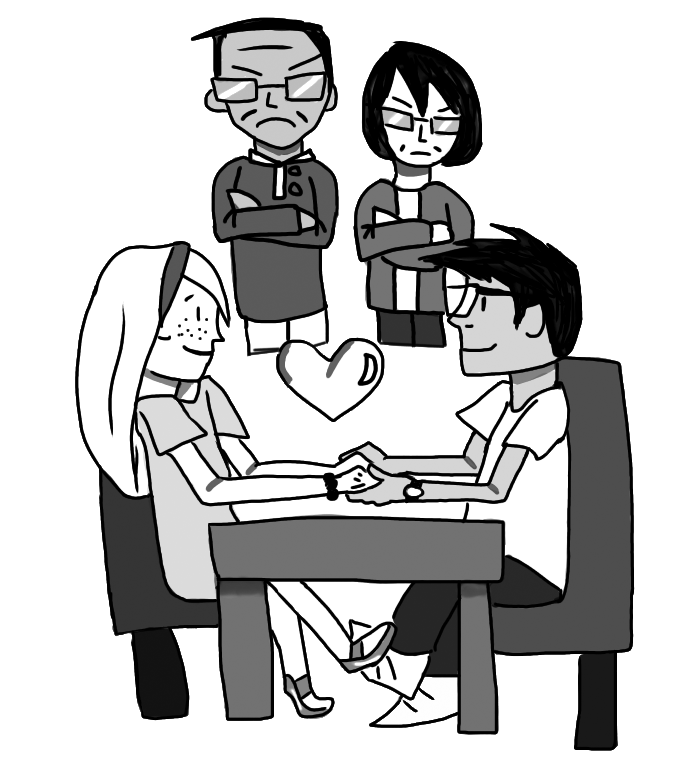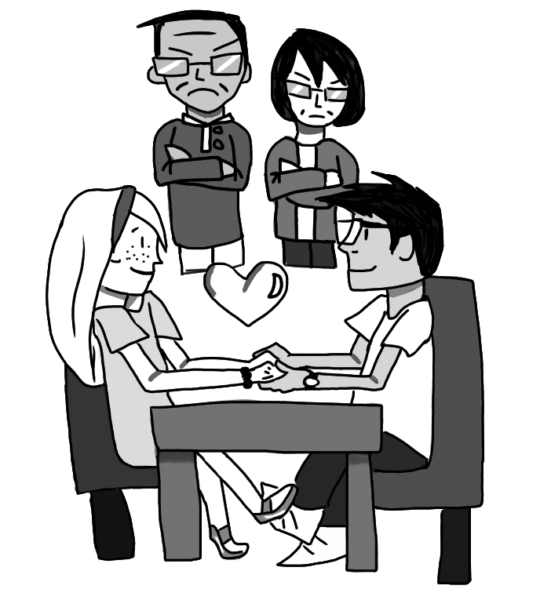

Physical appearance, personality and friendships all influence a person’s dating life and who they choose to have as a partner. Another factor that can impact a person’s dating life is race, whether this is because of what their parents or family want for them or simply what the individual prefers.
Senior Ben An is one of the people that has been affected by his parents’ views.
“When I was a freshman or in eighth grade,” he said, “I had this girl that I was going to go out with and she was Caucasian and my parents made me break up with her before we even started dating.”
Parents and other family members can sometimes dictate who a person can and cannot date, especially in middle and high school. Parents often want what is best for their children, and sometimes in their eyes, what is familiar is what is best. Senior Anna Chuakay attributes her family’s hesitation to this unfamiliarity.
“I think my family, for the most part, expects me to date someone who is kind of like us. We’re Asian, Filipino,” she said, “I feel like my family is open to Filipinos. They kind of critique [my partners] mostly if they’re a different race than I am. My boyfriend is white, so they critique him and say things like, ‘Is he the stereotype of a white person?’”
Senior Michael Collom, Chuakay’s boyfriend, has not had much trouble with his family regarding race in his dating life.
“My family and I, we kind of welcome everyone,” he said. “So [race] really hasn’t influenced [my dating life] that much.”
Many Asian cultures are particularly in favor of same-race marriages and may not allow or support interracial relationships. An faces a few challenges due to the stricter cultural norms he grew up with that his family follows.
“My grandparents really want me to marry an Asian girl,” he said. “[They] are really against me dating someone that’s not Asian.”
In An’s case, his family wants him to date within their race so that his partners have the same cultural values as they do. Senior Ella Rubin sees this in her Jewish family as well.
“My religion has important values, so I would want the person that I end up with to share those same values with me and I do agree [with my parents] that’s important,” said Rubin.
The judgment or comments made by peers about the race of a person’s partner can also influence them to adapt or develop a racial preference. If a person has the general tendency to make friends of the same race, those friends may see it as odd or abnormal if said person enters a relationship with someone of a different race.
“My first few relationships were with Caucasian girls and a lot of my friends didn’t really expect that,” An said. “So that was something different.”
Although racism is still present in our society today, interracial relationships are becoming more common. Even if some cultures and families might have reservations about their children dating a different race or culture, many don’t prevent those relationships completely, as seen in Chuakay’s family.
“I feel like now [interracial couples] are more common,” Chuakay said. “I feel like our society now is more supportive of interracial relationships … It’s not about the look of [the relationship], but more of the benefits like love, trust and loyalty that come out of it.”
Even though interracial relationships have become more socially acceptable, many people still say that they have a racial preference or “type.” Now people are beginning to question whether having a racial preference in dating is the same as racial prejudice. While some believe having a “type” is essentially racist, others believe that everyone is entitled to like who they like regardless of the impact of race in their preference.
Sophomore CJ Mallory sees both sides of this argument.
“If you don’t like to date a race, then you don’t like them,” he said. “But then the question is, why don’t you like them?”
Chuakay has a unique answer to this question.
“It’s okay to be attracted to a certain race because everyone is different and it’s not anything against a specific race,” she said, “we just prefer what we want. A weird comparison, but it’s like when we eat food. We try things, but if we don’t like it then we just don’t like it. Nothing against the food, it’s just what we like.”
Interracial couples continue to face a certain societal stigmas, whether it be from the people or world around them. However, there is no denying the great steps society has taken and continues to take in the acceptance of interracial relationships.




Very interesting article… also sad… my husband and I are not the same race, all three of our children are in interracial relationships… color of skin is not important, content of character is. It’s virtually impossible to keep your children from other races.. college is full of all types of students. They should have the right to like whom ever they choose as long as they have the same interests. The world is a big place why confine them let them live.